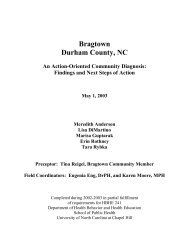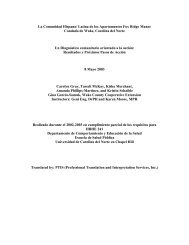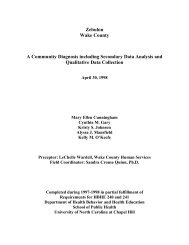The Health bulletin [serial] - University of North Carolina at Chapel Hill
The Health bulletin [serial] - University of North Carolina at Chapel Hill
The Health bulletin [serial] - University of North Carolina at Chapel Hill
You also want an ePaper? Increase the reach of your titles
YUMPU automatically turns print PDFs into web optimized ePapers that Google loves.
Januarij, 1927 <strong>The</strong> <strong>Health</strong> Bulletin 11<br />
POINTS ON CHILD BEHAVIOR<br />
BEING A PROPER PARENT IS THE MOST IMPORTANT JOB ANY<br />
OF US HAS<br />
By LAWSON G. LOAVREY, 3I.D.<br />
Director, Child Guidance Clinic No. 2, N<strong>at</strong>ional Committee for Mental Hygiene<br />
[We have never published a more interesting- and instructive article, especially to<br />
teachers, children and parents, than this from the Mental Hygiene Bulletin. We wish<br />
to urge every teacher to first read it through carefully, and then send it in turn to<br />
the parents <strong>of</strong> every child in the grade, with the special request th<strong>at</strong> they read and ask<br />
themselves the questions Doctor Lowrey so pertinently propounds.—Editor.]<br />
^<br />
1. Do I Cause My ChiJd To Be Kervoitsf<br />
2. Do I Cause My Child To Disobey<br />
3. Do I Cause My Child To Hare<br />
Temper Tantrums<br />
4. Do I Cause My Child To Be Dishonest<br />
<br />
5. Do I Frighten My Child .9o He<br />
Becomes Timid And Fearful<br />
Most parents \yould promptly answer<br />
"no"' to all the above questions and<br />
would resent the implic<strong>at</strong>ions contained<br />
in them. Yet child-guidance<br />
clinics and physicians and psychologists<br />
who make a special study <strong>of</strong><br />
behavior problems in children are<br />
constantly encountering situ<strong>at</strong>ions in<br />
which parents are clearly responsible<br />
for just such reactions in children. Of<br />
course, no intelligent and thoughtful<br />
parent deliber<strong>at</strong>ely sets out to do such<br />
things, but even the most intelligent<br />
<strong>of</strong>ten do not consider all the angles <strong>of</strong><br />
the problem involved in the rel<strong>at</strong>ionships<br />
<strong>of</strong> parent and child. <strong>The</strong> result is<br />
th<strong>at</strong> the parent is all too frequently<br />
the direct cause <strong>of</strong> distressing behavior<br />
in the child.<br />
In the following columns, remedies<br />
as well as preventive methods are discussed<br />
; but one should remember th<strong>at</strong><br />
it is easier to prevent the development<br />
<strong>of</strong> unhealthy behavior than it is to<br />
correct it.<br />
1. "Nervousness"'<br />
Do I Cause My Child To Be Nervous<br />
By<br />
: Being nervous myself Telling<br />
him about it so I may have his symp<strong>at</strong>hy<br />
Constantly reminding him how<br />
nervous he is Telling other people in<br />
his presence how nervous and queer<br />
and odd he is Worrying over his<br />
health and habits Worrying him with<br />
my worries over him Coddling him<br />
p/hysically and mentally Denying him<br />
independence <strong>of</strong> thought and action<br />
Expecting too much from him and<br />
driving him all the time<br />
// You Think Yo^lr Child Is Nervous,<br />
First Be Sure Of Yourself<br />
From early infancy some children<br />
are "nervous."<br />
<strong>The</strong>y are fussy, irritable<br />
babies ; delic<strong>at</strong>e, sensitive, easily upset<br />
children ; they become easily flustered,<br />
excitable adults. Such children demand<br />
the utmost in placidity and p<strong>at</strong>ience<br />
from their parents.<br />
Most "nervous" children are, however,<br />
the product <strong>of</strong> the management<br />
given them. <strong>The</strong>ir parents do some or<br />
all <strong>of</strong> the things listed above: Nervous<br />
parents expect, and so cause, nervous<br />
children. <strong>The</strong>y constantly remind the<br />
child <strong>of</strong> this. In their own nervousness<br />
they set an example, and it usually<br />
is imit<strong>at</strong>ed. <strong>The</strong>y communic<strong>at</strong>e their<br />
worries to the child, who increases<br />
them many fold. <strong>The</strong>y cannot permit<br />
the child to lead a life <strong>of</strong> his own,<br />
and either push him to the extreme<br />
limit, or do all the thinking for him.<br />
Cultiv<strong>at</strong>e calmness. Do not fuss <strong>at</strong><br />
the child. Give him peace ; an opportunity<br />
to do things and learn for himself.<br />
Use j'our common sense ; recall<br />
your own childhood ; be p<strong>at</strong>ient and<br />
kind. Settle your worries in some other<br />
way than by passing them on to the<br />
child. Know your child ; his interests<br />
and capacities ; his weaknesses and<br />
strong points. Above all, be yourself as<br />
calm and peaceful as you can. If you<br />
have any <strong>of</strong> the habits or <strong>at</strong>titudes<br />
listed above, change them.


![The Health bulletin [serial] - University of North Carolina at Chapel Hill](https://img.yumpu.com/33495252/17/500x640/the-health-bulletin-serial-university-of-north-carolina-at-chapel-hill.jpg)




![Bulletin of the North Carolina Board of Health [serial] - University of ...](https://img.yumpu.com/48032016/1/153x260/bulletin-of-the-north-carolina-board-of-health-serial-university-of-.jpg?quality=85)
![The Health bulletin [serial] - University of North Carolina at Chapel Hill](https://img.yumpu.com/47603625/1/169x260/the-health-bulletin-serial-university-of-north-carolina-at-chapel-hill.jpg?quality=85)
![The Health bulletin [serial] - University of North Carolina at Chapel Hill](https://img.yumpu.com/47242858/1/169x260/the-health-bulletin-serial-university-of-north-carolina-at-chapel-hill.jpg?quality=85)
![The Health bulletin [serial] - University of North Carolina at Chapel Hill](https://img.yumpu.com/43204263/1/172x260/the-health-bulletin-serial-university-of-north-carolina-at-chapel-hill.jpg?quality=85)
![The Health bulletin [serial] - University of North Carolina at Chapel Hill](https://img.yumpu.com/41981074/1/163x260/the-health-bulletin-serial-university-of-north-carolina-at-chapel-hill.jpg?quality=85)

![The Health bulletin [serial] - University of North Carolina at Chapel Hill](https://img.yumpu.com/40912928/1/164x260/the-health-bulletin-serial-university-of-north-carolina-at-chapel-hill.jpg?quality=85)

![The Health bulletin [serial] - University of North Carolina at Chapel Hill](https://img.yumpu.com/35643061/1/167x260/the-health-bulletin-serial-university-of-north-carolina-at-chapel-hill.jpg?quality=85)
![Biennial report of the North Carolina State Board of Health [serial]](https://img.yumpu.com/34024350/1/166x260/biennial-report-of-the-north-carolina-state-board-of-health-serial.jpg?quality=85)
